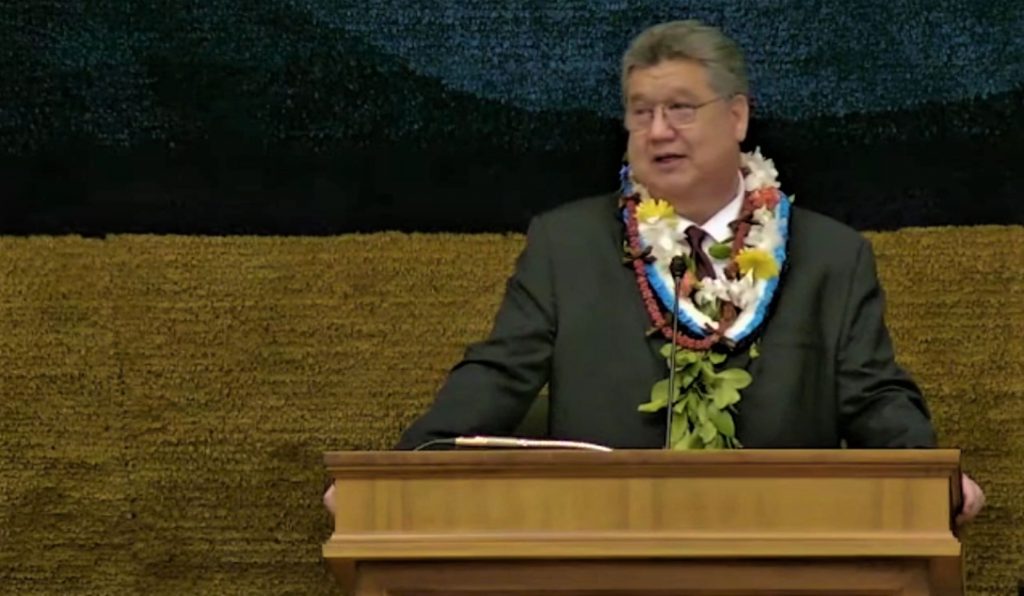32nd Hawai‘i Legislature ends 2023 session
Lawmakers sported lei around their necks, but there was no hula, music or packed gallery Thursday in the House of Representatives chamber at the state Capitol like there was on opening day nearly five months ago.
The 32nd Hawai‘i Legislature still had work to do in Honolulu before members could clock out on the final day of the 2023 session.
Both chambers spent several hours taking up last-minute measures, including the proposed state biennium budget.
Lawmakers in the House spent nearly half of their approximately 4-hour final session on the chamber floor debating the budget.
The majority of representatives agreed the operating and capital improvement budget package sets up the state for decades of success by providing funds for issues and priorities that include housing and housing services, homelessness services, agriculture initiatives, infrastructure, greater tax credits for working families, child care and early childhood education, teacher housing and salary increases, health care, and protecting and preserving the state’s natural resources.
The budget also includes $300 million in capital funding for projects throughout the state, including $50 million for improvements at Hilo Medical Center and $18 million for upgrades at Kona Community Hospital, and excavation and dredging to reopen the Pohoiki boat ramp in Puna, for which $40 million had been requested, that was landlocked by the lava flow during the 2018 eruption of Kilauea on the Big Island.
Hawai‘i Gov. Josh Green in a statement earlier this week touted funds for:
- A new contract that rewards people who become teachers.
- More than $60 million for kauhale and ‘Ohana Zones to address chronic homelessness.
- $30 million in loan forgiveness to recruit and retain social workers, nurses and physicians for Hawai‘i.
- The beginning of generational tax reform for asset limited income constrained families.
Several legislators, however, didn’t think the budget goes far enough or is insufficient in some areas. Those who opposed the spending bill cited concerns, including:
- Failure to increase funding for programs targeted at strengthening food security for low-income families.
- Not adequately funding and even underfunding the Hawai‘i Department of Education and University of Hawai‘i system.
- Exceeding the state’s spending limits.
- Providing raises for state leadership.
- Putting additional funds in an already bloated rainy day fund instead of putting that money where it is needed now.
“This budget has a few bright spots, and I do celebrate those, but it is sorely lacking in aloha for our state,” said Big Island Rep. Jeanné Kapela, who voted against the measure.
Some members who supported the spending bill had reservations. But a majority agreed that while it is not perfect, it supports many of the State Legislature’s priorities.

The Senate also took up several measures on the last day of session, including the budget, which it passed. The spending measure was transmitted to the governor for his consideration shortly after noon on Thursday.
According to information from Green’s office, the Legislature has allocated housing-related resources to several areas regarding homelessness and housing, including $280 million for the rental housing revolving fund, $48 million for kauhale projects throughout the state, $15 million for ‘Ohana Zones and more than $150 for the Hawai‘i Community Development Authority for infrastructure improvements for housing developments.
When it comes to health care, Green’s administration was able to secure funds for several investments including $1.5 million for Family Assessment Centers and $5.6 million for the state’s nursing facilities, which will also get a $7.1 million federal boost; $30 for the Hawai’i State Loan Repayment Program for medical professionals to recruit, retain and attract doctors, nurses and social workers to the state; and $30 million per year for the biennium, matched with $43 million in federal funds, to increase reimbursement rates for Medicaid, ensuring parity in those rates and facilitating access to higher quality care for Medicaid patients.

Green also lauded the Legislature for working to address the cost of living in the state with a Phase I tax relief package as part of the Green Affordability Plan that prioritizes working families, including doubling the earned income tax credit and food tax credit and improving the existing child and dependent care tax credit.
“The end of the 2023 Legislative Session marks an important date as a critical first step to lower Hawaiʻi’s cost of living, construct truly affordable housing, protect our natural environment and promote the health and wellness of our residents,” a press release from the governor’s office said Thursday afternoon, adding that many of the measures passed this session embrace the bold vision he outlined in his State of the State address.
The Legislature also took up a book full of other measures prior to its final day of the 2023 session, including bills and resolutions concerning issues such as gun control, criminal justice reform, human trafficking, protection for humpback whales, grounded vessels and more.
While it had its ups and downs, most lawmakers — including leadership — agreed they accomplished a lot.
House Speaker Scott Saiki said in his closing remarks that the measures passed during the session hit on important issues to the state, including protecting native forests, tax relief for working families, traffic safety, telehealth, 31 standard of conduct laws, gun control, ‘Ohana Zones, homelessness services, Medicaid physician reimbursement, invasive species control, women’s reproduction rights, mental health and assisted community treatment, preschool, university campus security and reform of the Hawai‘i Tourism Authority.
“The list goes on and on and on,” he said.

Saiki also said: “All of us want to advance Hawai‘i so that all people have opportunity and hope. In just four months, you seized the opportunity to solve some of our most pressing problems.”
He reiterated comments that this session set a foundation that lawmakers can only build upon in the future and their work will improve the lives of the state’s residents, environment and their commitment to the principles of justice and equality.
House Minority Leader Lauren Matsumoto in her closing remarks said she is proud of what lawmakers have accomplished; however, their work is never finished.
“In this interim, we must continue to forge ahead to regain the trust of the people and re-establish our legislative processes to be about the people and good policy,” Matsumoto said. “It is our duty to work together for the people of Hawai‘i and I look forward to working with all of you to reach this goal.”
Big Island Sen. Dru Kanuha, the Senate majority leader, said his chamber delivered on many of its priority areas this year, including addressing the state’s cost of living, improving public health and access to health care resources, ensuring that every child has the opportunity to receive quality public education, and increasing affordable housing.
While there were many measures that did not make it through this year, the majority leader is confident that those that were passed “will provide immediate relief to our neighbors in need while laying the foundation for a strong, prosperous future.”

Senate President Ron Kouchi agreed there were bills he wished had passed, but with new lawmakers in both chambers and on both sides of the aisle, agreement couldn’t be reached on everything.
“But when you look at what we passed, wow,” Kouchi added.
He said somehow people wanted to create division this year, but lawmakers came together. He cited the Senateʻs unanimous passage of the budget.
“The one thing I didn’t talk about on opening day that I have talked about in the past was looking forward to the opportunity to be a grandfather,” Kouchi said in his final remarks. “I am so thrilled to be before you today to let you know that within the past week, I am now able to stand before you as Papa Kouchi. We have a new grandson in our family, and when I hit the gavel, I’m excited to return back to Kaua’i and spend some time with my grandson.”
“Congratulations, Papa Kouchi,” Senate Majority Floor Leader Glenn Wakai said. “Let’s do it all again in eight months.”
















